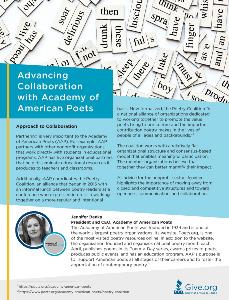The Academy of American Poets was founded in 1934 and is one of the world’s largest poetry organizations. Its website, Poets.org, is one of the most visited poetry resources online. In addition to the website, the organization founded and organizes national poetry month each April, publishes poems in its Poem-a-Day series, awards prizes to poets, produces public events, and has an education program. AAP’s purpose is to “support American poets at all stages of their careers and to foster the appreciation of contemporary poetry.”1
Featured Guest
Jennifer Benka, President and CEO
Academy
of American Poets
Approach to Collaboration
Partnering is very important to the Academy of American Poets (AAP). For example, AAP partners with other nonprofit organizations that work directly with students in educational programs. AAP has five organizational partners that help disseminate educational resources it produces to teachers and classrooms.
Additionally, AAP coordinates the Poetry Coalition, an alliance that began in 2015 with an informal lunch between poetry leaders at a conference who expressed interest in working together on a more regular and intentional basis. Now formalized, the Poetry Coalition “is a national alliance of organizations dedicated to working together to promote the value poets bring to our culture and the important contribution poetry makes in the lives of people of all ages and backgrounds.”2
The coalition works with a relatively flat organizational structure and consensus-based model that enables meaningful participation. The member organizations believe that together they can better magnify their impact.
As advice for the nonprofit sector, Jennifer highlights the importance of moving away from closed and competitive structures and toward openness, communication, and collaboration.
Application of the 9 Considerations for Collaboration
Build Trust
For Jennifer, the formation of the Poetry Coalition involved willing leaders able to envision their potential collective impact, and that willingness felt magical. The poetry leaders’ first meeting was held in Santa Fe, a neutral space since none of the coalition founders were from that city, which helped create a shared experience and build relationships, and importantly, trust among leaders. This trust is a key to the coalition’s success.
Have a Vision
The coalition founders also shared frustration. Although their respective organizations had high levels of public participation, the media continued to promote the notion that few people were engaging with poetry. This misperception did not help poetry organizations to secure funding. When the leaders convened, they defined their goals for the future: to inspire more readers and financial support and demonstrate that poetry can make meaningful contributions to communities and public debate.
Seek to Assure the Success of Collaborators
As one of the largest organizations in the poetry field, AAP took on the responsibility of raising funds to support coalition work and providing the necessary administrative resources to sustain its efforts.
Sometimes, you don’t see what assets you have until others see it. AAP added value by sharing assets it already had: AAP’s website now has a special section for the coalition (the coalition does not have its own website), and AAP dedicates part of its staff’s time to the coalition, among other important contributions, including PR and marketing.
Start Small
The first coalition meeting included 17 leaders, but it has grown to 25. Members share information to deepen and demonstrate the coalition’s impact. Coalition members have talked about adding more organizations, but they want to scale at a manageable pace. Jennifer is mindful that it is difficult to obtain funding to support a large network, and that with a smaller group, it’s easier to ensure participation and effective coordination.
Fail Fast, and Build Rigorous Feedback Loops
Someone must drive the car, but a leader must have an open mind and be able to admit when they’re wrong. It is also important to be transparent. For example, for one of its programs, the coalition had decided on one theme. After realizing it did not have consensus on that theme, it decided to go back to the drawing board with the project to reach consensus before moving forward. It is essential in collaboration to gather input from all parties on critical matters.
Take a Portfolio Approach
It is essential to be open to innovation, experimentation, and to try new things. This also implies a kind of agility nonprofits need to succeed in the digital age. Part of the agility is also structural lightness: collaboration is not just about creating new entities.
Consider Non-traditional Partners
The coalition is composed of poetry organizations, which are traditional partners to AAP, but AAP has also worked with non-traditional partners for the coalition and more. For example, for coalition programming, AAP has engaged organizations on issues to help share related poems and resources so readers might learn more; each March members address a timely social theme such as migration or democracy.
Keep Your Donors Apprised of Your Collaborations
AAP has consistently documented and promoted the Poetry Coalition’s successful collaborative work and model, which helped AAP secure funding from the Silicon Valley, Ford, and Mellon Foundations to help underwrite the coalition’s work, which includes an annual convening and programming.
Future Collaborations
For future collaborations, Jennifer is interested in thinking more about other non-traditional partners to help share poetry outside of typical venues and publications because she believes poetry can matter to everyone.
1
https://poets.org/academy-american-poets
2
https://www.poets.org/academy-american-poets/poetry-coalition



